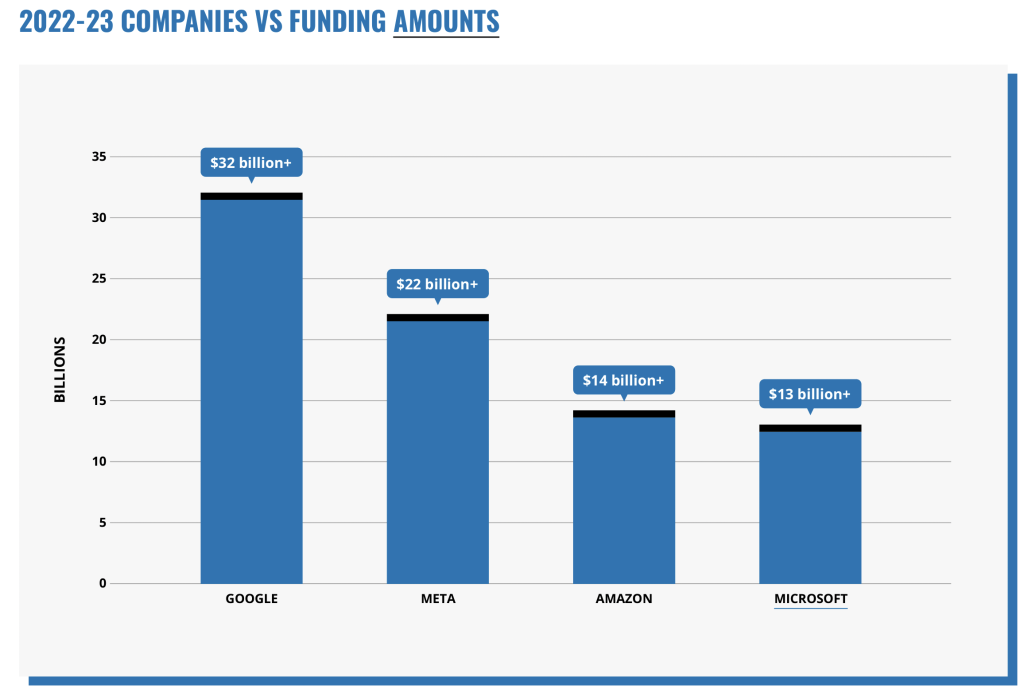
Elon Musk during an interview at DealBook Summit 2023 on November 30th (photo: Digital Music News).
In our most recent DMN Pro Weekly report, Digital Music News tallied the tens of billions of dollars that AI giants have already amassed in funding. But that’s not the biggest threat facing major labels as they lock horns with AI behemoths like Google, Meta, Amazon, OpenAI, and Microsoft — time is.
For a complete breakdown of recent major label dealmaking in the AI arena, check out our recent DMN Pro Weekly report on AI voice cloning. In that report, we take a closer look at the AI handshakes between Universal Music Group, Warner Music Group, and YouTube — with Sony Music Entertainment noticeably missing from the picture. We also add up the giant funding war chests being amassed by AI giants like Google, Amazon, and OpenAI ahead of legal battles facing the big three and the entire music and content industries.
For those who believe that AI giants like OpenAI are treating copyrighted content ethically, Elon Musk has a wake-up call. “That’s a huge lie,” Musk bluntly stated during a recent interview at DealBook Summit 2023 while addressing claims by AI platforms that copyrighted materials are not being used to train algorithms. “These AIs are all training on copyrighted data, obviously. It’s a straight-up lie, 100%.”
That’s hardly shocking to those within the music industry, though the more difficult pill involves the lengthy legal and legislative battles that lie ahead. Despite a string of early legislative victories surrounding human authorship and copyrights, a far bigger set of lawsuits will determine whether training on copyrighted content constitutes fair use.
Recently, major AI platforms like Anthropic started saying the quiet part out loud. Last month, the Amazon- and Google-backed Anthropic declared that a “diverse array of cases supports the proposition that [the] copying of a copyrighted work as an intermediate step to create a non-infringing output can constitute fair use.”
Disagreeing are Universal Music Publishing Group, Concord Music Group and ABKCO, who are suing the tech behemoth for copyright infringement. Usually, that type of litigation would stop a startup in its tracks. But Anthropic seems to be navigating a speed bump: despite the massive lawsuit, the company’s feverish funding pace has continued, with hundreds of millions being piled onto the company.
Universal Music Publishing Group, part of the largest music conglomerate in the world, isn’t suing a group of pimply-faced coders anymore. That means millions of dollars in legal fees and potentially years of back-and-forth tussling before a judgment or resolution emerges — with just one of the major AI platforms.
Others are also filing lawsuits against the giants of AI. ChatGPT developer OpenAI is currently fending off a major lawsuit filed by a class of creatives led by Sarah Silverman, with a decision potentially years away. Getty Images’ infringement lawsuit against Stability AI has dragged on for nearly a year.

Note: With frequent investments in on-house AI products and independent AI companies, funding amounts are approximations based on available data and may differ from exact amounts
So, what do all these cases have in common — besides the copyright part?
Unfortunately, all of these cases are likely to burn time — lots of it. And that’s the last thing that litigating copyright owners can afford. “By the time these lawsuits are decided, we’ll have digital God at that point,” Musk predicted. “These lawsuits won’t be decided in a timeframe that is relevant.”
In other words, the longer these cases drag on, the more advantage mega-companies like Google, Meta, Amazon, and OpenAI enjoy. And the more likely that content owners forge ‘amicable’ agreements like those involving YouTube and major labels UMG and WMG.
DMN Pro Weekly: Should We Just Get Used to AI Voice Cloning?
All of which raises a scary question: how far will AI sophistication and intelligence evolve in the next few years?
Musk has been particularly alarmist on AI’s growth trajectory, complete with Armageddon-tinged predictions. In the recent DealBook interview, Musk predicted that AI could write a book ‘as good as J.K. Rowling,’ discover a new physics principle, or invent a new technology within three years.
That sounds like a very different world in 2026, particularly for the music industry. Whether the AI train goes that fast is impossible to predict, just like the nuances of AI’s impact on areas like songwriting, synch licensing, music production, and even avatar development. But perhaps one thing is certain: the longer these AI legal battles drag on, the less advantage copyright owners enjoy given the hectic pace of AI training, technological development, the copyright ingestion.
Whether that suggests greater cooperative licensing agreements is worth debating. But for those fighting to defend copyright, the courts simply can’t be the only battlefield.


